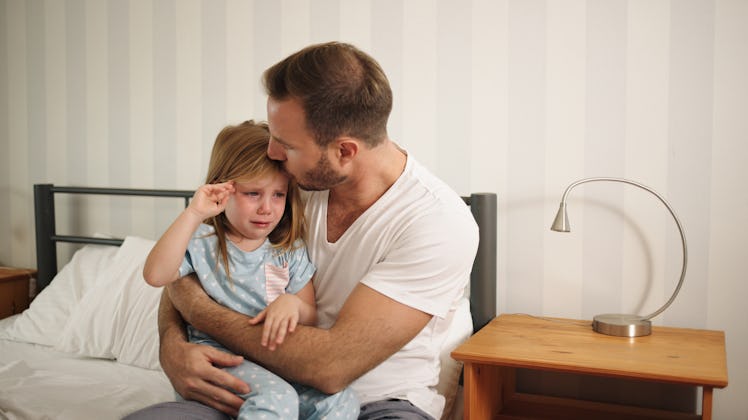How To Restore The Peace After Disciplining A Child
A process of parental time outs and calm talk will help get the discipline train back on track.

There is a fatal flaw in child discipline that can throw everything into chaos. That flaw is that fact that parents and children are both human and thus prone to the powerful wash of hormones upon their neurotransmitters — prone, in other words, to lose their sh*t. Parents may seek to discipline without high emotion, but they inevitably get emotional. It’s impossible not to, especially when a kid just…won’t…get..it…. And that means the kids will get emotional as well and then when the dust begins to settle, that those emotions will hang in the air like a thunderhead. The trick to disbursing with all that bad electricity? Not electrifying a circuit.
“Unfortunately what most parents do is yell, scream, criticize and threaten,” says Larry Koenig, developer of the Smart Discipline system “A lot of discipline, unfortunately, is done without a lot of planning to it and it’s done unfortunately with anger.”
That’s unsurprising, of course. The need for discipline is often the result of a kid doing something dangerous, rude, or destructive. Sometimes they’ve done it not out of spite, but to test boundaries. Other times, however, a kid will look a parent right in the eye and rip the cover off the book, or drop the glass of milk, or punch their sister in the gut. It’s infuriating. And, before the last drop of milk has even hit the floor, it’s game on.
The problem is that anger creates a feedback loop. Children, being the empathic creatures, pick up on parental anger. For older children, they might realize keeping a parent angry might mean the eventual abandonment of the original discipline. “More than likely, after awhile you’re not going to follow through on that discipline anyway,” says Koenig. “So what have you taught the child?”
In these circumstances, Koenig suggests the parents go into timeout. “You need to take a step outside, or go to your room and sit down and take 10 deep breaths and literally calm yourself down,” he suggests. That’s because the chemical processes associated with anger shut the brain off from logical thought. Logic is crucial for a parent because illogical discipline is neither sustainable or effective.
The Four-Pronged Approach to Restoring Peace After Discipline
- Take a “timeout” when discipline turns angry. Take a step outside or sit down and take 10 deep breaths to calm yourself down.
- Model to a child how a parent can be upset and then calm down in order resolve something.
- Give out hugs and reassurances when appropriate, even if a certain punishment remains.
- Be honest with a child about your own role in escalating arguments. Rethink punishment if it was given out in anger. In other words, take it away and apologize if it’s truly unfair or comes from the wrong place.
Taking 10 shaky breaths in the bedroom to get focused and calm might feel like a failure of discipline, but Koenig notes that, in fact, it’s a parental opportunity. Parents who can come back to a child calm after going ballistic are actually modeling appropriate emotional management techniques. It shows the kid that going into the red doesn’t mean staying in the red. And while anger might happen, there are appropriate ways of dealing with it.
Helping a kid understand that requires the post parental timeout step of talking it out with the kid. “It may take a little while for the kid to calm down because he’s stuck in his emotions too,” says Koenig. “You’re wanting to model to your child how it is you can be upset and then calm down and resolve something.”
It’s important to note that parents can absolutely comfort a kid in these situations to get them to relax again. Hugs and reassurances are totally appropriate. But does that mean that the discipline will be rescinded?
“You might have to say: I was angry when I laid out that punishment and it was too harsh and I’m going to rethink that,” says Koenig. That’s because punishment should not be given in anger. If the escalation occurred after a reasonable punishment was given out, parents need to talk to the kid about their own role in that escalation. But they also need to reaffirm that the discipline will still occur. That’s because consistency and solid expectations are key to effective discipline.
“Where people get upset is where they warn and warn,” says Koenig. “Eventually you lose your temper. You want to break that pattern.”
This article was originally published on